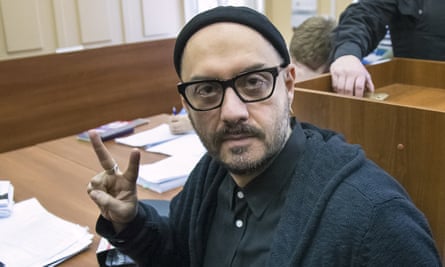It has been a productive year so far for the Russian director Kirill Serebrennikov. His Gogol Centre continues to be one of Moscow’s best theatres, his cinematic homage to the 1980s Leningrad rock music scene impressed audiences at Cannes and he is preparing a new production of Così fan tutte to premiere at the Zurich Opera House next month.
It’s all the more impressive because Serebrennikov has spent the entire year under house arrest. As rehearsals for Così fan tutte got under way in Zurich in recent weeks, the production’s director was sitting more than 1,000 miles away, confined to his Moscow apartment.
Serebrennikov is awaiting trial on embezzlement charges that many in the Moscow arts world have decried as politically motivated, and he has been under house arrest since he was charged in August last year. He is accused of helping to embezzle state funds between 2011 and 2014, and has said the charges are nonsense and that the money was spent on production costs.

Serebrennikov is banned from using a telephone or the internet and can only converse with his lawyer, but he is allowed to use a computer. So at the end of each rehearsal a video is sent to his lawyer, who puts it on a USB stick and delivers it to the director at his Moscow apartment.
“All communication has to go through the lawyers, so we send video recordings and then he sends back his written or video comments, again via the lawyer,” said his assistant, Evgeny Kulagin, who is working on the production in Zurich.
Andreas Homoki, the director of the opera house, said he commissioned Serebrennikov two years ago after seeing his work on stage in Germany. When the arrest took place, he assumed the detention would be temporary and decided to proceed with the production.
As Serebrennikov’s house arrest dragged on, the theatre became increasingly worried. “The director is obviously someone who has to sit there and give personal input and feedback,” Homoki said. He contacted another director who was ready to step in if Serebrennikov was not released by February this year.
“My deadline was the end of February but I was talking to different people, including my family, and my son told me you can’t do that and I realised he was right.”
Ruzan Mantashyan, an Armenian soprano who sings Fiordiligi, one of the two lead female roles, said: “It’s a different atmosphere to anything else I’ve worked on but we really know what Kirill wanted and Evgeny has done a great job. I don’t feel disconnected.”
Serebrennikov is known for edgy, contemporary stagings, most notably at the Gogol Centre. He has put on a number of opera productions, including a version of Nikolai Rimsky-Korsakov’s The Golden Cockerel that was a vicious satire about the current Russian elite, at the Bolshoi theatre in 2011.
His production of Nureyev, a ballet charting the life of the Soviet dance star Rudolf Nureyev, was postponed at the last minute by the Bolshoi last summer, shortly before Serebrennikov’s arrest, amid rumours that the production’s gay themes had offended the theatre’s powerful patrons.
It eventually premiered in December, becoming Moscow’s cultural event of the year, with oligarchs, film stars and members of the Kremlin elite in the audience but the director still under house arrest. A nude photograph of Nureyev was cropped to remove the genitalia.
Serebrennikov has many powerful backers in Russia but his contemporary approach has made him enemies in the traditional establishment. “If you want to hang Nureyev’s cock on the back of the stage, do it at your Gogol Centre. Why do it in the Bolshoi theatre?” said Nikita Mikhalkov, a Russian film director and cheerleader of President Vladimir Putin, at the time.
Mozart’s Così fan tutte was written as a comedy, about two men who pretend they have been sent away to fight a war and then come back in disguise to woo their partners and test their fidelity.
Homoki said Serebrennikov had created a production set in the present day that was unusually serious. “It takes the aspect of going to war quite seriously, so they really go to war,” he said.
Mantashyan said: “In this production, the boys come back completely changed. There’s nothing silly about it, they’re not just wearing a silly moustache, they’re actually different people.”
Serebrennikov has managed to be productive from home but at his most recent court hearing, last month, he pleaded with the judge to allow him to go free on bail while the trial was pending, noting he had already been under house arrest for more than a year.
“The most important thing for me is work, and to prevent me from working is punishment,” he said.
